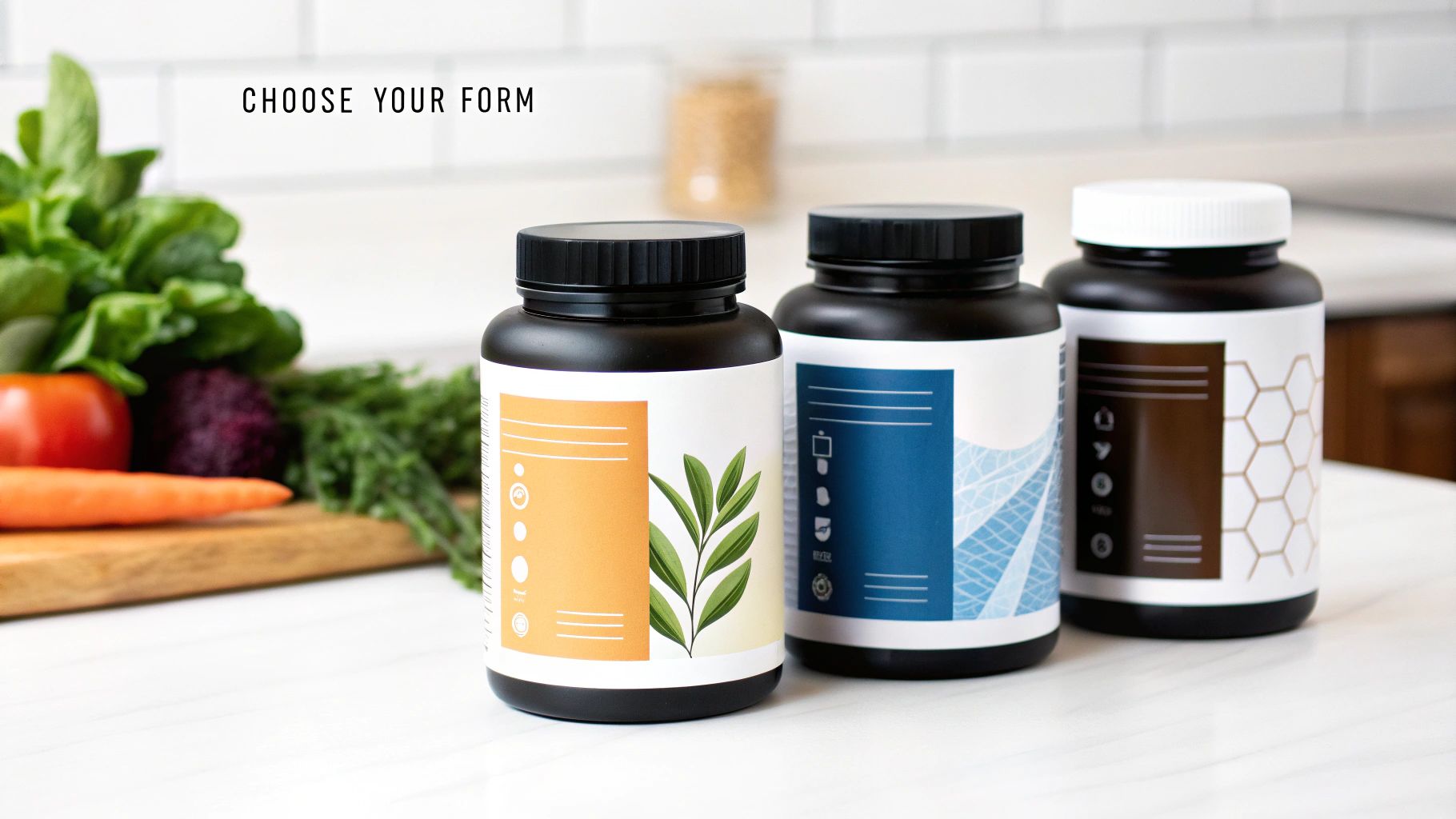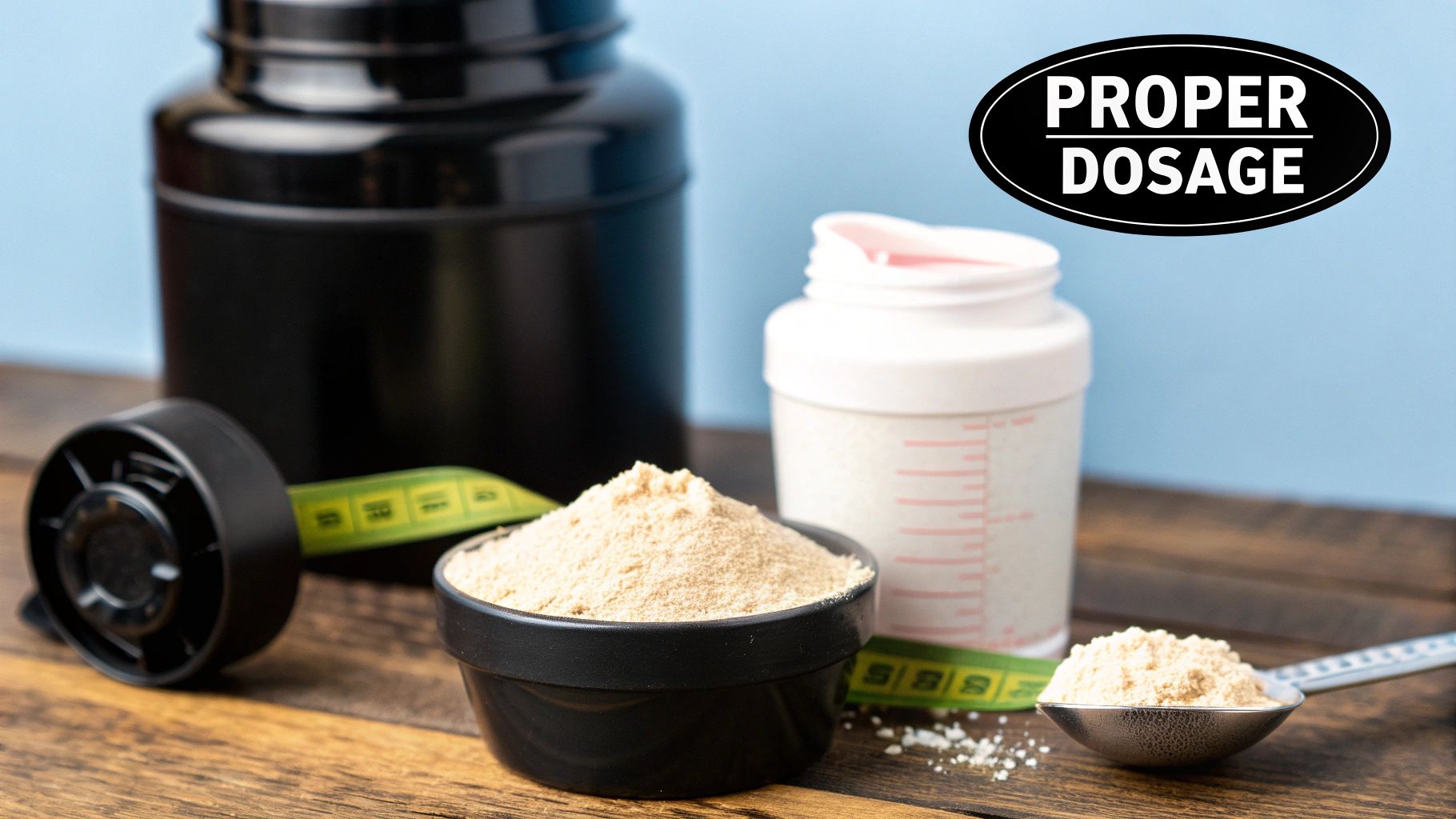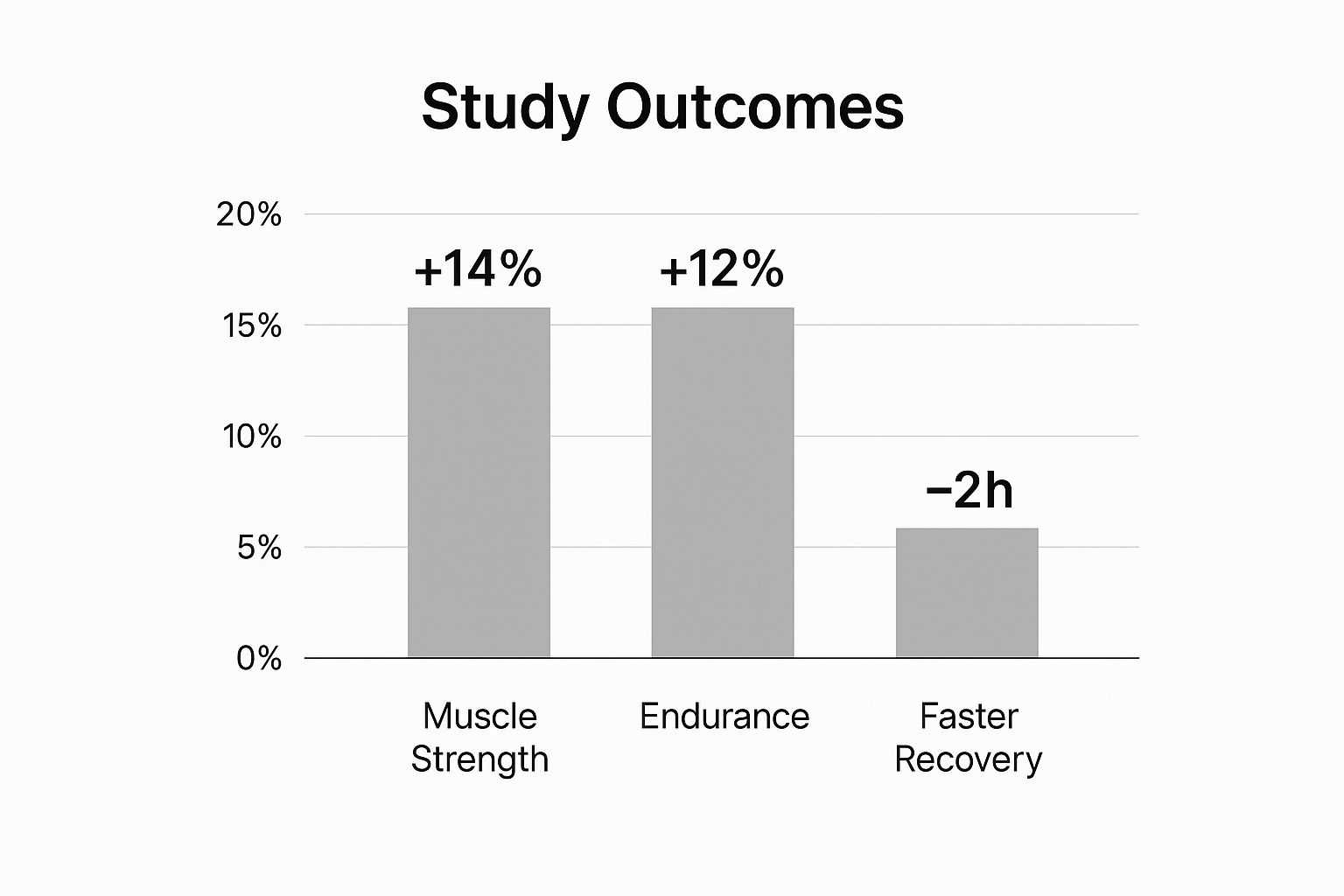Creatine Benefits for Women: Complete Guide to Muscle & Mind

Why Your Body Craves Creatine More Than You Think
Imagine trying to get through a demanding day with your smartphone perpetually stuck at 10% battery. Every task feels harder, and the device is constantly on the verge of shutting down. This is a perfect analogy for how a woman's body often operates without optimal creatine levels. It's a fundamental energy source that your muscles and brain rely on, yet a key biological difference puts women at a disadvantage from the start.
This isn't just about athletic performance; it's about your daily capacity to function at your best. From intense workouts and stressful workdays to the mental load of managing a household, your body’s power system is frequently running on reserves. Understanding this energy gap is the first step to unlocking major improvements in strength, mental sharpness, and overall well-being.
The Great Creatine Divide
The main reason your body needs this vital compound lies in a simple yet significant physiological fact: women naturally have 70-80% lower endogenous (naturally produced) creatine stores compared to men. This isn't a defect; it's a biological distinction with profound effects on daily life. It means that for every squat, every sprint, and every focused work session, you’re starting with a much smaller internal energy reservoir.
Supplementation doesn't just top off the tank—it helps build a bigger one. The creatine benefits for women are so noticeable precisely because they are correcting a significant natural deficit, not just adding a minor boost. When you start from a lower baseline, even a standard dose can lead to substantial gains in how you feel and perform.
Hormones, Life Stages, and Your Energy Needs
A woman’s life is a dynamic journey of hormonal shifts, each presenting unique energy demands. Your menstrual cycle, pregnancy, and menopause aren't just monthly or life-stage events; they are periods where your body's creatine use changes. For instance, fluctuations in estrogen can influence how your body produces and uses creatine, affecting everything from mood and cognitive function to muscle strength.
Research shows that creatine supplementation offers distinct advantages across these different stages. Pre-menopausal women often see notable improvements in muscle strength and exercise capacity. Post-menopausal women can benefit from increased skeletal muscle size and function, which is critical for combating age-related muscle loss, especially when combining a higher dose with resistance training. You can explore the full study about these life-stage findings to see just how impactful it can be.
This is where understanding your own body becomes a powerful tool. Instead of following generic fitness advice, you can address your specific needs.
To put this into perspective, let's look at a direct comparison of creatine levels and how supplementation bridges the gap.
| Creatine Stores: Women vs Men |
|---|
| Comparison of natural creatine levels and supplementation impact between genders |
| Measure |
| Natural Creatine Stores |
| Response to Training |
| Cognitive Impact |
The evidence clearly shows that the creatine benefits for women are not just a smaller version of what men experience. They are unique, addressing specific physiological needs that have long been overlooked. For those looking for a convenient way to integrate this into a busy schedule, learning more about different forms in this creatine gummies guide can be a great starting point.
The Three-Pound Muscle Transformation Secret
 Picture adding three pounds of lean, functional muscle to your body. This isn't about getting "bulky" or adding unwanted weight. It’s about building metabolically active tissue that changes how your body looks, feels, and performs. This is one of the main creatine benefits for women, especially when paired with consistent resistance training.
Picture adding three pounds of lean, functional muscle to your body. This isn't about getting "bulky" or adding unwanted weight. It’s about building metabolically active tissue that changes how your body looks, feels, and performs. This is one of the main creatine benefits for women, especially when paired with consistent resistance training.
The real action happens at the cellular level. Think of your muscles during a tough set of squats or shoulder presses. Their primary fuel source is a molecule called ATP (adenosine triphosphate). As you push yourself, your muscles burn through ATP quickly, which leads to fatigue. Creatine works like a rapid-recharge system for ATP, helping you squeeze out a few more reps or lift a slightly heavier weight before hitting your limit. This extra effort is the exact signal your muscles need to grow stronger.
More Than Just Muscle: The Ripple Effect
This process is about more than just appearance; it's about building a more resilient body from the inside out. Those extra pounds of lean muscle create a powerful ripple effect across your overall health. More muscle mass boosts your resting metabolism, since muscle burns more calories at rest compared to fat. This can make it easier to maintain a healthy body composition in the long run.
Beyond metabolism, this process sends important signals for your bones to get stronger too. When your muscles contract against resistance, they pull on your bones. This is a beneficial stress that stimulates bone-forming cells, which can lead to increased bone mineral density. For women, who face a higher risk of osteoporosis later in life, this is a major long-term health advantage. Stronger muscles and bones provide a solid foundation for daily life, making tasks like carrying groceries or playing with your kids feel easier.
A Powerful Ally Against Age-Related Muscle Loss
The ability to build muscle is particularly important for women as they get older. A 2017 meta-analysis highlighted just how effective this supplement can be. It found that women who took creatine while strength training gained an average of three pounds more muscle than those who only did the training. This is a key advantage in fighting sarcopenia—the natural, age-related loss of muscle that affects mobility and metabolic health. You can read more about these impressive muscle-building findings and understand why it's a valuable tool for lifelong strength.
In the end, the muscle you build with creatine's help is far more than a number on the scale. It's a metabolic engine, a support system for your skeleton, and a reserve of strength that improves your quality of life. It’s the secret to not just looking stronger, but feeling more capable in everything you do.
Unlocking Your Brain's Hidden Potential
 While creatine is celebrated for its muscle-building prowess, its ability to power your brain is just as remarkable. Picture your brain as a high-performance computer that’s always been running on a standard battery. Creatine is like plugging it into a supercharger. Despite its small size, your brain is a major energy consumer, using about 20% of your body's total energy. It depends on the same rapid-recharge ATP system that your muscles use during a tough workout.
While creatine is celebrated for its muscle-building prowess, its ability to power your brain is just as remarkable. Picture your brain as a high-performance computer that’s always been running on a standard battery. Creatine is like plugging it into a supercharger. Despite its small size, your brain is a major energy consumer, using about 20% of your body's total energy. It depends on the same rapid-recharge ATP system that your muscles use during a tough workout.
This is especially important for women. Moments of mental fog during your cycle, feeling scattered due to stress, or needing sharp focus for a big project are all times when your brain's energy supply is put to the test. Supplementing with creatine helps foster what researchers call a 'pro-energetic environment' in the brain. You’re giving your mind a more dependable and powerful energy source, making this one of the most significant creatine benefits for women.
Sharpening Your Focus and Fighting Mental Fatigue
Have you ever felt completely drained after a long day of meetings or intense studying? That sensation is your brain running low on its immediate energy stores. Creatine supplementation directly counters this by keeping phosphocreatine levels high in the brain, which acts as a buffer against mental fatigue. This means you can maintain focus longer, process information faster, and feel mentally sharper during challenging tasks. The diagram above illustrates how central creatine is to brain energy, acting as a key player in recycling ATP. This cellular process is what leads to better cognitive performance in the real world, helping you stay on top of your game.
This cognitive boost is particularly useful in several situations:
- Students: During intense study sessions or before an exam, creatine can help support cognitive function and memory, especially when you're sleep-deprived.
- Professionals: For those juggling multiple projects and tight deadlines, it offers the mental stamina needed to reduce errors and remain productive under pressure.
- Menopause: Many women report "brain fog" during menopause. Creatine can support brain energy levels that are affected by hormonal shifts, potentially improving mental clarity.
Just as creatine supports cognitive function, you can explore other ways to improve your mental capabilities by reading about concepts like how to evolve your brain.
Mood Stabilization and Hormonal Harmony
New research also suggests that creatine can have a positive impact on mood. The function of neurotransmitters like serotonin and dopamine is closely tied to the brain's energy levels, so keeping your brain well-fueled can have a stabilizing effect. For women, this is particularly helpful during the hormonal shifts of the menstrual cycle or perimenopause, when mood swings and low energy are common. By supporting a more stable energy environment in the brain, creatine may help lessen the severity of these symptoms and contribute to a better sense of well-being.
The Reproductive Health Connection Nobody Talks About

Beyond stronger muscles and a sharper mind, one of the most surprising creatine benefits for women involves an area that rarely gets the spotlight: reproductive health. New research suggests this compound might play a quiet but important role in supporting your menstrual cycle and overall reproductive system. When you look at the biology, this connection makes a lot of sense.
Imagine your pelvic floor, uterus, and other reproductive tissues as having their own intense energy needs. Just like the muscles you work out at the gym, these tissues are constantly active, especially during menstruation and pregnancy. They demand a huge amount of cellular fuel to work properly. This is where creatine, the master of quick energy delivery, comes into the picture.
Fueling Your Cycle and Pelvic Health
The link boils down to energy metabolism. Your reproductive system is filled with cells that rely on ATP to do their jobs, from enabling uterine contractions to maintaining the strength of your pelvic floor. When these cells have a steady energy reserve, they can perform at their best. Supplementing with creatine can give these high-demand tissues the fuel they need to function smoothly.
This boost in cellular energy may lead to a couple of key improvements:
- Less Discomfort During Your Period: Painful periods, or dysmenorrhea, are often tied to forceful uterine contractions and inflammation. By giving these muscles more energy, creatine might help them contract more efficiently, which could ease the intensity of cramps.
- Better Pelvic Floor Support: The pelvic floor muscles are essential for supporting your reproductive organs. Improved energy supply can lead to stronger, more resilient muscles, which is vital for long-term pelvic health.
This isn't just a theory anymore. New studies are starting to draw clear lines between creatine and female reproductive wellness. For instance, a study of U.S. women aged 12 and older discovered a significant connection between higher dietary creatine intake and a lower likelihood of reporting pelvic pain and severe menstrual cramps. This finding suggests that having enough creatine might directly help make your cycle more manageable. You can read more about these reproductive health findings to see the full scope of the research.
What This Means for You
For women who struggle with difficult periods or are simply focused on their long-term reproductive health, this research opens a new door for nutritional support. While it isn't a magic cure, making sure your body has enough creatine could be a simple way to support your system from the inside out.
The standard 3-5 gram daily dose is generally effective for these potential benefits. Consistency is key, just as it is for muscle and cognitive gains. This approach ensures your entire body, including your reproductive system, has a steady supply of energy to draw from, helping you feel your best through every part of your cycle.
Navigating Creatine Through Every Life Stage
A woman’s body is in a constant state of change, and your nutritional plan should adapt right along with it. Your relationship with creatine isn’t static; it’s a dynamic partnership that can be fine-tuned to support you through every decade and life event. Just as your needs shift from your twenties through post-menopause, your creatine approach can be adjusted to get the most out of it at each stage.
This adaptability is what makes creatine such a powerful tool. It’s not a one-size-fits-all supplement but a compound whose effects can be directed toward your most important needs, whether that’s athletic performance, support during pregnancy, or preserving muscle and bone in later years.
Your Twenties and Thirties: Performance and Cognition
During your primary reproductive years, the focus is often on physical performance, cognitive sharpness, and managing the monthly hormonal shifts of your cycle. Creatine is a strong ally for these goals. By ensuring your muscles have plenty of energy, it helps you push harder in workouts, leading to better strength gains and body composition. At the same time, it supports brain energy to help you stay focused during demanding work projects or fight the mental fog that can come with PMS.
Pregnancy and Breastfeeding: An Emerging Area of Interest
The role of creatine during pregnancy and breastfeeding is a fascinating and developing field of research. These stages place huge energy demands on the body, not just for the mother but for the growing fetus and newborn. Creatine is essential for fetal brain development and growth. While more human studies are needed to create clear guidelines, the biological logic is strong. It is believed that maintaining proper creatine levels may support both maternal energy and fetal health.
It is absolutely essential to consult with your doctor or a registered dietitian before taking any supplements, including creatine, during pregnancy or while breastfeeding. They can give you personalized advice based on your health history and specific needs, ensuring the safety of both you and your baby.
Perimenopause and Post-Menopause: Preserving Strength and Bone
This is where creatine really stands out. As estrogen levels drop during perimenopause and post-menopause, women face a faster loss of muscle mass and bone density. Creatine supplementation, especially when paired with resistance training, becomes a vital tool for fighting back. Research shows post-menopausal women see major benefits, including:
- Increased muscle mass and function: Helping to fight age-related muscle loss, known as sarcopenia.
- Improved bone health: When combined with strength training, creatine helps preserve bone density, lowering the risk of osteoporosis.
- Enhanced mood and cognition: By supporting brain energy levels, it can help manage the "brain fog" many women experience during this transition.
To make it easier to see how these recommendations change over time, the table below outlines specific dosing strategies for each phase of a woman's life.
| Life Stage | Typical Dose | Primary Benefits | Special Considerations |
|---|---|---|---|
| Reproductive Years (20s-30s) | 3-5 grams/day | Athletic performance, cognitive function, mood stability during menstrual cycle | Start with a lower dose to assess tolerance. Consistent daily use is key. |
| Pregnancy & Breastfeeding | Consult a Physician | Fetal growth and brain development, maternal energy support | This is an emerging area of research. Medical supervision is mandatory. |
| Perimenopause (40s) | 5 grams/day | Muscle mass preservation, bone density support, mood and cognitive function | Combine with regular resistance training for best results. |
| Post-Menopause (50s+) | 5-8 grams/day | Combating sarcopenia, reducing fracture risk, improving brain health and daily function | Higher doses may be needed to overcome age-related resistance. Always pair with exercise. |
This table shows that while a standard dose works well for many, adjusting your intake can offer targeted support as your body's needs evolve, particularly during and after menopause.
The following infographic illustrates some of the performance gains women can expect from consistent creatine use.
 These statistics show that creatine provides a multi-faceted boost, enhancing not just raw strength but also how long you can perform and how quickly you bounce back. By understanding how your needs change, you can adjust your creatine strategy to powerfully support your body and mind through every chapter of life.
These statistics show that creatine provides a multi-faceted boost, enhancing not just raw strength but also how long you can perform and how quickly you bounce back. By understanding how your needs change, you can adjust your creatine strategy to powerfully support your body and mind through every chapter of life.
Your Personal Creatine Implementation Blueprint
Now that you know the powerful benefits of creatine for women, let's create a simple plan to fit it into your daily life. The goal here is consistency, not complexity. Think of it like choosing your route for a road trip—some people prefer the fast lane to get there quickly, while others enjoy a more scenic, steady drive. Both paths lead to the same destination: fully saturated muscles and a well-fueled brain.
To Load or Not to Load?
One of the first questions women ask is whether they need a “loading phase.” This just means taking a higher dose for a few days to quickly fill up your muscle's creatine stores. Let's look at the two main ways to start so you can pick the one that feels right for you.
- The Loading Approach: This is the express route. You take about 20 grams of creatine a day for 5-7 days, usually split into four 5-gram servings. This method gets your muscles saturated fast, which is great if you have a competition or event coming up and want to feel the benefits sooner. The only potential drawback is that the higher dose can sometimes cause temporary bloating or minor stomach upset for some women.
- The Steady-State Approach: This is the simpler, gentler method. You just start with the standard maintenance dose of 3-5 grams of creatine every single day. It will take a bit longer to reach full muscle saturation—roughly 3-4 weeks—but you'll arrive at the same place. This approach is often preferred because it's easy to follow and has a lower chance of causing any initial water retention or digestive issues.
In the long run, both methods are equally effective. The best one is simply the one you can stick with every day.
Building Your Daily Routine
Once you've picked your starting strategy, making creatine a part of your day is easy. Here’s a quick guide to make it a lasting habit and get the most out of every dose.
Step 1: Choose Your Time
The golden rule is to take your creatine daily. Don't get too caught up in the perfect timing. While some research suggests a small benefit to taking it post-workout for recovery, the difference is minimal. The best time is simply the time you won't forget.
- Morning: Mix it into your coffee, tea, or smoothie.
- Post-Workout: Add a scoop to your protein shake to support muscle repair.
- Anytime: For maximum convenience, especially on hectic days, options like our tasty creatine-infused gummies make it effortless to stay consistent.
Step 2: Mix It Right
Creatine monohydrate powder is flavorless and mixes well in almost any liquid. To give absorption a little boost, try taking it with some carbohydrates or protein. This can help "shuttle" the creatine into your muscles more effectively. A glass of juice, your protein shake, or even just taking it with a meal works perfectly. Remember to drink plenty of water throughout the day to stay hydrated.
Step 3: Track What Matters
How can you tell it's working? Instead of watching the number on the scale (which might go up slightly at first due to water), pay attention to your performance.
- Are you able to lift a little bit heavier in the gym?
- Can you squeeze out one more rep on your final set?
- Do you feel more focused and mentally sharp during a challenging workday?
These are the real-world signs that your creatine plan is working for you.
Separating Creatine Facts From Fiction
Despite decades of research proving creatine is one of the safest and most effective supplements, a cloud of myth and confusion still follows it, especially when it comes to women. It’s time to clear the air and look at what the science actually says. Many of the worries you might have heard are based on outdated ideas or simple misunderstandings of how creatine works in the female body.
Let’s tackle the most common concerns head-on. By understanding the truth behind these myths, you can feel confident making an informed decision about your health and fitness journey.
Myth 1: Creatine Will Make Me Bulky and Manly
This is probably the most persistent myth holding women back. The fear is that taking creatine will automatically lead to oversized, bulky muscles. This is fundamentally untrue. Creatine contains no hormones and doesn't have the power to make you grow huge muscles without a very specific and intense training and nutrition plan designed for that single purpose.
Think of it this way: creatine is like premium fuel for your car's engine; it doesn’t change the size of the engine. It simply allows the engine you already have to perform at its best. For women, this means leaner, stronger, and more toned muscles—not bulk. Any initial weight gain is usually from increased water inside the muscle cells, which is a sign of proper hydration and function, not fat gain.
Myth 2: Creatine Is Unsafe and Damages Your Kidneys
This concern often arises from confusion about how the body processes creatine. When your body breaks down creatine, it creates a byproduct called creatinine. Healthy kidneys work to filter creatinine from your blood. While high creatinine levels can sometimes signal kidney problems, these levels naturally rise when you supplement with creatine and are not a sign of damage.
Countless studies, including long-term research, have consistently shown that for healthy people, taking the recommended 3-5 grams of creatine daily is perfectly safe and does not harm kidney function. Major organizations like the International Society of Sports Nutrition confirm its excellent safety profile.
Myth 3: It’s Only for Elite Athletes and Bodybuilders
While creatine is a go-to supplement for professional athletes, its advantages are available to anyone looking to improve their strength, energy, and mental clarity. Whether you're a busy mom, a professional aiming for better focus at work, or a woman focused on healthy aging, the creatine benefits for women are widespread.
It supports everyday energy production, helps maintain muscle as you age, and can even contribute to a more stable mood. You don't need to be lifting heavy weights to feel its positive effects on your overall quality of life. For an easy and tasty way to get your daily dose, our Smash Creatine Gummies provide a perfect solution.

